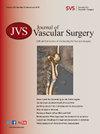Incidence and predictors of gastrointestinal hemorrhage following mesenteric revascularization
IF 3.9
2区 医学
Q1 PERIPHERAL VASCULAR DISEASE
引用次数: 0
Abstract
Objective
Postoperative gastrointestinal hemorrhage (GIH) following mesenteric revascularization when performed either openly (OR) or endovascularly (ER) has been clinically observed but not reported. The aim of the study is to assess the incidence and predictors of GIH in patients undergoing mesenteric revascularization.
Methods
This was a single-center retrospective review of consecutive patients treated with open or endovascular mesenteric revascularization from 2009 to 2019. Patients with nonocclusive mesenteric ischemia, intraoperative or perioperative death within 24 hours, or no postoperative follow-up were excluded. Primary endpoints were incidence and predictors of clinically significant GIH (CS-GIH) within 30 and 60 days postoperatively. CS-GIH was defined if patients required red blood cell transfusion, hospital readmission, escalation to intensive care, prolonged discontinuation of anticoagulation, or need for endoscopy/colonoscopy.
Results
A total of 260 patients presented with mesenteric ischemia and underwent OR/ER. Two hundred five patients met inclusion criteria (139 female [68%]; mean age of 69.9 years [range, 18-92 years]). Presentation was chronic mesenteric ischemia in 128 patients (62%), acute-on-chronic in 45 (22%) and acute in 32 (16%). Ninety-three patients (45%) underwent OR, 93 (45%) ER, and 19 (9%) hybrid. Fifty patients (24%) presented with GIH, 44 (21%) within 30 days of OR/ER, at a median time of 6.5 days postoperatively. CS-GIH occurred in 37 patients (18%), which led to death in two patients (1%), prolongation of intensive care unit course or transfer to intensive care unit in 28 patients (14%), red blood cell transfusion in 21 (10%), diagnostic/therapeutic endoscopy/colonoscopy in 18 (9%), and hospital readmission in 14 patients (7%). Endoscopy/colonoscopy was diagnostic in nine patients (ulcer in five patients, angioectasia in two, and anastomotic bleeding or colonic necrosis in one each), therapeutic in four, and identifying one patient with diffuse bleeding requiring operative intervention. Factors associated with increased risk of CS-GIH were bowel resection during index hospitalization (odds ratio [OR], 11.29; P < .001), acute presentation (OR, 5.42; P < .001), atrial fibrillation (OR, 3.01; P = .004), first-time initiation of antiplatelet therapy (OR, 2.61; P = .01), and treatment with stenting (OR, 2.31; P = .03).
Conclusions
Patients undergoing mesenteric revascularization are at high risk for postoperative GIH, which increases morbidity and hospitalization resources in nearly 20% of patients. Specific patient groups are at high risk for CS-GI hemorrhage. Postoperative care pathways should consider these risk factors to reduce CS-GIH after mesenteric revascularization to improve outcomes.
肠系膜血管重建术后消化道出血的发生率和预测因素
目的:肠系膜血管重建术后胃肠道出血(GIH)在开放手术(OR)或血管内手术(ER)中均有临床观察,但未见报道。本研究旨在评估肠系膜血管重建术患者 GIH 的发生率和预测因素:单中心回顾性研究 2009-2019 年间接受开放或血管内肠系膜血管重建术的连续患者。排除非闭塞性肠系膜缺血、术中或围手术期24小时内死亡或无术后随访的患者。主要终点是术后30天和60天内临床显著性肠系膜缺血的发生率和预测因素。如果患者需要输注红细胞、再次入院、升级到重症监护、长期停止抗凝或需要进行内镜/结肠镜检查,则定义为有临床意义的 GIH(CS-GIH):共有 260 名肠系膜缺血患者接受了手术室/手术室手术。205名患者符合纳入标准(139名女性[68%],平均年龄69.9岁[18-92岁])。128名患者(62%)表现为慢性肠系膜缺血,45名患者(22%)表现为急性肠系膜缺血,32名患者(16%)表现为急性肠系膜缺血。93人(45%)接受了手术室手术,93人(45%)接受了急诊室手术,19人(9%)接受了混合手术。50名患者(24%)出现GIH,其中44名(21%)在手术/急诊室手术后30天内出现,术后中位时间为6.5天。37名患者(18%)出现CS-GIH,导致2名患者(1%)死亡,28名患者(14%)重症监护室病程延长或转入重症监护室,21名患者(10%)输注红细胞,18名患者(9%)接受内镜/结肠镜诊断/治疗,14名患者(7%)再次入院。内镜/结肠镜检查对 9 名患者进行了诊断(5 名患者为溃疡,2 名患者为血管扩张,1 名患者为吻合口出血或结肠坏死),对 4 名患者进行了治疗,并发现 1 名患者有弥漫性出血,需要进行手术干预。与CS-GIH风险增加相关的因素有:住院期间肠切除术(OR 11.29,P<0.001)、急性发病(OR 5.42,P<0.001)、心房颤动(OR 3.01,P=0.004)、首次开始抗血小板治疗(OR 2.61,P=0.01)和支架治疗(OR 2.31,P=0.03)(表I):结论:接受肠系膜血管重建术的患者术后发生胃肠道出血的风险很高,近20%的患者会因此增加发病率和住院资源。特定患者群体是 CS-GI 大出血的高危人群。术后护理路径应考虑这些风险因素,以减少肠系膜血管重建术后 CS-GIH 的发生,从而改善预后。
本文章由计算机程序翻译,如有差异,请以英文原文为准。
求助全文
约1分钟内获得全文
求助全文
来源期刊
CiteScore
7.70
自引率
18.60%
发文量
1469
审稿时长
54 days
期刊介绍:
Journal of Vascular Surgery ® aims to be the premier international journal of medical, endovascular and surgical care of vascular diseases. It is dedicated to the science and art of vascular surgery and aims to improve the management of patients with vascular diseases by publishing relevant papers that report important medical advances, test new hypotheses, and address current controversies. To acheive this goal, the Journal will publish original clinical and laboratory studies, and reports and papers that comment on the social, economic, ethical, legal, and political factors, which relate to these aims. As the official publication of The Society for Vascular Surgery, the Journal will publish, after peer review, selected papers presented at the annual meeting of this organization and affiliated vascular societies, as well as original articles from members and non-members.

 求助内容:
求助内容: 应助结果提醒方式:
应助结果提醒方式:


